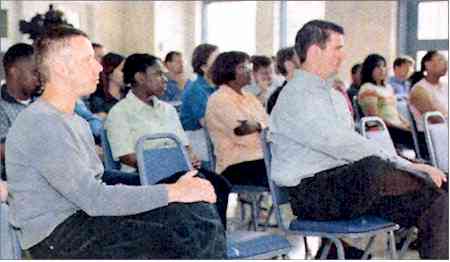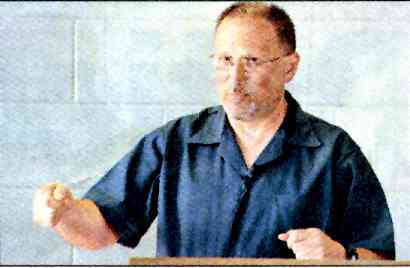Scared Straight
Inmates Teach MBA Students Ethics from behind BarsI do not believe in immortality of the individual, - Albert Einstein The ideals which have always shone before me and filled me with the joy of living are goodness, beauty, and truth. - Albert Einstein (again) Cumberland, Maryland - Before getting diplomas Wednesday night, the University of Maryland's MBA graduates got a lesson in life from distinguished alumnus Gerard Evans. A lawyer renowned as the state's highest-paid lobbyist, he boasts deep ties to the university. He earned a master's degree at Maryland, taught there and served on the school's board of visitors. Currently, he is a doctoral candidate in the American studies program.
Former lobbyist Gerard Evans was convicted of fraud. Evans does his doctoral work at a distance, though, because he also happens to be prisoner No.33950-037 at the Federal Correctional Institution here. A trip to prison is mandatory for second-year Maryland MBA students, part of an ethics class intended to puncture their sometimes sizable egos just weeks before they graduate and leap to the corporate world. Maryland officials describe the 1-day prison field trip as a kind of "scared-straight" program for MBAs. The purpose is to show them how smart, successful, business-savvy overachievers - people like them - can land in the slammer.
Life lessons: University of Maryland students Mike Rodgers (from left), Murders, rapes, assaults and other violent crimes have been declining across the USA over the past two decades. But rates for embezzlement, fraud and other white-collar crimes have proved stubbornly resistant, remaining steady despite beefed up law-enforcement efforts. Experts say computers and cross-border commerce have made white-collar crimes easier to commit and easier to conceal. At the same time, the growing ranks of women in top jobs have led to a surge in the number of women convicted of embezzlement and other financial crimes, says the National White Collar Crime Center. Few graduates will confront more on-the-job pressure, responsibility and temptation than the USA's latest crop of 100,000 MBA graduates. In an annual rite of spring, Wall Street investment banks, consulting firms and consumer-products marketers are scooping them up and launching them on high flying careers. Many of Maryland's 188 MBA graduates are leaving school with dream jobs in hand - at Marriott, Oeloitte & Touche, Accenture, Booz Allen & Hamilton. Johnson & Johnson, Intel, Citibank and other companies. Their starting salaries, with bonuses, are likely to top last year's average of $85,959. It's important that hubris doesn't bring these newly minted MBAs crashing to earth, says Larry Penley, dean of the college of business at Arizona State University. "A single person with an MBA makes decisions that have a huge impact on a business," he says. "If you look at some of the recent scandals, you (typically) see a person with a lot of autonomy in a global corporation that has a centralised information system. The damage you can do under those circumstances is considerable." Skills Gone AwryHubris was central to the downfall of Evans and two other white collar offenders telling their tales to the Maryland MBA students. Ego may have gotten the better of Evans, once a $1 million-a-year lobbyist in Annapolis. The 45-year-old was sentenced to 30 months for fraud after he was accused of conspiring to get a lawmaker to sponsor a bogus bill intended to bring panicky clients to his lobbying firm. Evans reputation as a hired gun was legendary in Maryland state politics. "From abortion to gambling to gun control, I was always in the mix," he says. Evans and convicted embezzler Greg Gamble, 49, sound other common themes. They say it's the little gray-area decisions that ultimately lead to more serious ethical and legal breaches. "That got to me," student Patricia Martinez says later. "It made me think we're al just one decision away from the big decision that leads to trouble."
Martinez: All close to "the big decision that leads to trouble." No Good Deed Can DefendThe inmates also concur on this: Civic involvement and good deeds count for little when federal sentencing guidelines come into play. Gamble was president of a local anti-crime group and sat on the United Way board; Evans trial judge lauded him as a model father of five. "Judges don't have any discretion," Evans says. "There's no, 'Hey, I've been a pillar of the community all my life.'" Despite broad agreement about the importance of an ethics education among business school educators and corporate leaders, it's hard not to conclude that MBA students get a mixed message. On one hand, the Association to Advance Collegiate Schools of Business requires MBA programs to include ethical issues in their curricula in order to get accreditation. On the other hand, the schools are free to address the subject almost any way they like. As a result, some offer required, semester-long classes; others weave ethics lessons into core classes on finance, accounting and other disciplines; and still others opt for short ethics "modules" of 2 to 5 classes. Maryland's ethics module is taught over 2 days and graded pass or fail, although school officials say their program is the only one to require a prison trip. Contradictions are evident in the corporate world, too. Companies are showing greater awareness of the need to develop rigorous ethics codes that can be monitored by outside auditors. And 75% of the USA's 1,000 largest companies have ethics or compliance officers, says O C Ferrell, who teaches ethics at Colorado State University. But the subject of on-the-job integrity almost never surfaces in job interviews, the Maryland students say. "I don't know if it's that they don't care," says Tamar Livneh, who's headed for a job as an associate brand manager at Campbell Soup. "They may not want to own up to the fact that ethical issues come up on your job. They're trying to sell you on their company." Livneh, 26, admits she's likely to face moral and legal choices in her job but doesn't believe they'll be as tough as the choices lying ahead for friends going into investment banking and real estate. "My biggest ethical dilemma might be: 'Do we say we're putting in this amount of noodles when we're really putting in this amount?'" Big Topic to CoverEthics educators at business schools say they have lots of ground to cover. MBA students are armed with sophisticated knowledge of finance, so it's vital they know the dangers of earnings manipulation, money laundering, price fixing, accounting fraud, intellectual property theft and insider trading. They need to know how to recognise harassment and discrimination, and how to handle whistleblowers. And they need to consider the moral implications of polluting a community or closing a plant or firing a worker who's about to be vested. Beyond that, students need to know how to put together corporate ethics codes and policies, Ferrell says. "The only way you can prevent rogue employees is to have control mechanisms and managers who don't tolerate inappropriate behaviour," he says. Back at the prison in Cumberland, the students have lots of ground to cover, too. In addition to seeing the work camp, they will tour an adjacent medium-security prison that houses 1,200 inmates, mainly drug offenders who live in much harsher conditions than the white-collar convicts. Unlike toe razor-wired, medium-security facility, the camp where Evans and Gamble are serving time has no fences. Its leafy mountain setting strikes some students as a cushy place to do an easy prison stretch. "Your federal tax dollars at work," jokes one. "I've got to ask about conjugal visits," another says. Minutes later, they hear the men tell of the humiliation they go through. Even without fences, it's hard not to feel degraded when you're subject to a delousing, have to stand for mandatory daily prisoner counts or work a prison job that pays you 12 cents an hour, they say. The Maryland students wear sober looks as the men speak of the pain they've caused their families.
Former CEO Gregory Gamble was convicted of embezzling Gamble, who embezzled Social Security payments he managed for the disabled, says his family members would have to be counted among his hundreds of victims. Since he began serving a 32-month sentence, his mother has been moved to a nursing home, his father has had a heart attack and his wife has divorced him. His oldest son has visited just twice in 10 months. His youngest son won't come to Cumberland "because he doesn't want to say goodbye." Source: USA Today Thursday 24 May 2001 photo credit: Bill Perry for USA Today See also:
For articles on white collar and petty crimes, injustice, capital punishment, race, executioners, freedom of the press, cheating, private prisons, punishment, retribution,
prison labour, appeals, instant justice, electronic tags, lepers and second chances click the "Up" button below to take you to the Table of Contents for this Prisons section. |
 Animals
Animals Animation
Animation Art of Playing Cards
Art of Playing Cards Drugs
Drugs Education
Education Environment
Environment Flying
Flying History
History Humour
Humour Immigration
Immigration Info/Tech
Info/Tech Intellectual/Entertaining
Intellectual/Entertaining Lifestyles
Lifestyles Men
Men Money/Politics/Law
Money/Politics/Law New Jersey
New Jersey Odds and Oddities
Odds and Oddities Older & Under
Older & Under Photography
Photography Prisons
Prisons Relationships
Relationships Science
Science Social/Cultural
Social/Cultural Terrorism
Terrorism Wellington
Wellington Working
Working Zero Return Investment
Zero Return Investment


